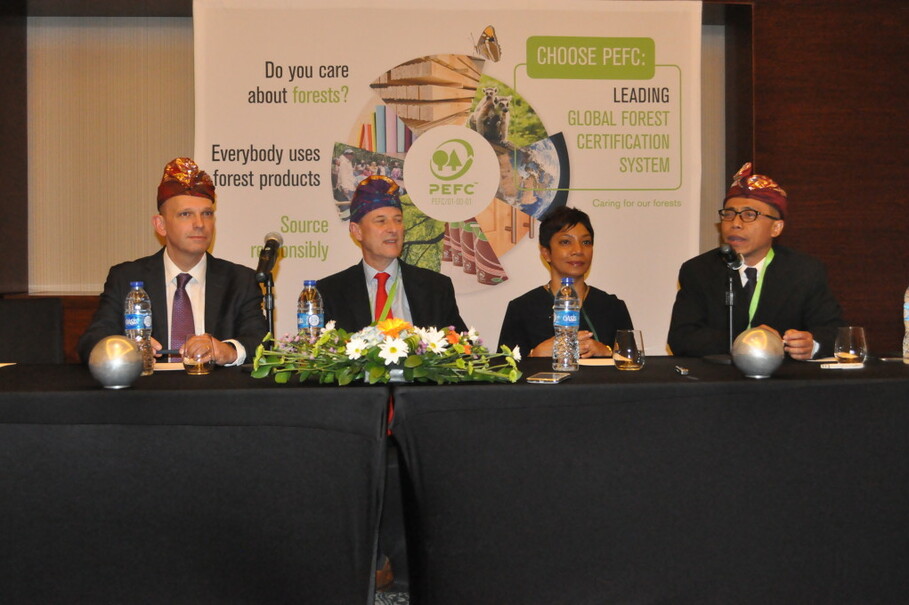
From left to right, Ben Gunneberg, chief executive and secretary general of PEFC, PEFC chairman Peter Latham, PEFC vice-chairman Sheam Satkuru Ganzella and IFCC chairman Dradjad WIbowo at a press conference in Kuta, Bali. (Photo courtesy of IFCC)
Kuta, Bali. Indonesian Forestry Certification Cooperation, or IFCC, a national governing body of the world's largest forest certification system — the Program for the Endorsement of Forest Certification or PEFC, is developing a new community forest certification scheme to improve certification rate for sustainable forestry practices in the country.
Product certification from IFCC and PEFC is voluntary but will help companies that manufacture, process, trade or sell timber or timber-based products gain access to the global market, as it guarantees that the products are responsibly sourced and traceable.
The certification scheme has 46 national governing bodies around the world.
Currently, more than 300 million hectares of forests are certified to PEFC's internationally recognized sustainability benchmarks, supplying more than 18,000 chain-of-custody-certified companies globally with responsibly sourced timber and timber-based products.
PEFC's certification is acknowledged by multinational companies like American multinational retailer Walmart, and also American fast food giants McDonald's and Pizza Hut.
IFCC chairman Dradjad Wibowo said on Wednesday (17/11) that Indonesian companies are mindful of ethical consumption's rising popularity, evidenced by many market research results in the past few years.
The IFCC itself was established in 2011.
Buyers of timber-based products, he said, are seeking assurance that the products they will distribute were produced without damaging forest sustainability, and also help conserve biodiversity.
"Businesses shouldn't just be looking for profit, but also help to preserve the environment," Dradjad told journalists on Wednesday.
Dradjad was speaking on the sidelines of the PEFC's 21st Annual General Assembly at the Sheraton in Kuta, Bali, that ran from Monday to Wednesday.
In Indonesia, there are about 1.8 million hectares of industrial plantation forest that have been IFCC/PEFC-certified and the international non-governmental organization has also recognized 24 local chain-of-custody-certified companies.
Dradjad said the IFCC's community forest and community plantation certification will help Indonesian producers of furniture and carving products — like the many in Bali — reach international markets, including the biggest supermarket chain in the world Walmart.
"Due to the high cost, IFCC is also developing a new scheme where communities will not have to pay for the certification," he said.
Drajad said the IFCC will soon also offer certification for milk, cereal and even book packaging.
Currently, only a slew of major local companies like Indonesia's largest bookstore chain and publisher Gramedia, Asia Pacific Resources International Limited — producer of the PaperOne photocopy paper, Asia Pulp and Paper — producer of the Paperline photocopy paper and AirAsia's in-flight magazine Travel 3Sixty Magazine have earned PEFC certification.
Dradjad also urges young people in Indonesia to be more aware of environmental issues and help put pressure on companies to comply with sustainable forestry practices.
At the same event, the chief executive and general secretary of PEFC, Ben Gunneberg, said the organization wants every stakeholder in the world to work together to create sustainable livelihood by managing in sustainable ways the world's dwindling number of forests.
"Think global, but act local. Sustainable forestry cannot happen unless we can create a sustainable livelihood for everyone," he said.
Sumber berita: jakartaglobe.id


